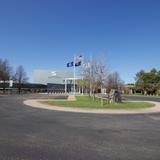- Finlandia University offers students a diverse curriculum and an atmosphere that is supportive and friendly to each of its 550 students. The intimate learning environment that our students find in our small classes, and the relationships and friendships they forge with their classmates and employees of the university last a lifetime. If you are looking for approachable faculty, the opportunity to experience our academic excellence, and the chance to gain the skill and knowledge base to make you successful in the 21st century, Finlandia is the place for you.
School Highlights
Finlandia University served 424 students (91% of students were full-time).
The college's student-teacher ratio of 3:1 was lower than the state community college average of 19:1.
Minority enrollment was 96% of the student body (majority Black), which was more than the state average of 40%.
School Overview
Finlandia University
(MI) Community College Avg.
Carnegie Classification
Associates Colleges
Baccalaureate/Associate's Colleges: Associate's Dominant
Institution Level
Four or more years
At least 2 but less than 4 years
Institution Control
Private not-for-profit
Public
Total Faculty
145 staff
224 staff
School Calendar
Student Body
Total Enrollment
424 students
3,006 students
Student-Teacher Ratio
3:1
19:1
# Full-Time Students
385 students
904 students
# Part-Time Students
39 students
2,102 students
# Enrollment Undergraduate
389 students
219 students
# Full-Time Undergraduate Students
385 students
965 students
# Full-Time Graduate Students
n/a
4 students
# Part-Time Undergraduate Students
39 students
2,448 students
# Part-Time Graduate Students
n/a
4 students
Total Dormitory Capacity
178 students
188 students
% American Indian/Alaskan
1%
n/a
% Asian
6%
4%
% Hispanic
n/a
7%
% Black
8%
16%
% White
4%
60%
% Hawaiian
60%
1%
% Two or more races
21%
4%
% Non Resident races
n/a
2%
% Unknown races
n/a
6%
Diversity Score
0.58
0.60
College Completion Rate (Students who graduate in less than 4 years)
n/a
28%
College Completion Rate (Students who graduate in 4 years or more than 4 years)
21%
20%
Average Graduate Earnings (10 Years)
$31,800
$30,700
Tuition and Acceptance Rate
Private State Tuition Fees
$21,480
$8,280
% Students Receiving Some Financial Aid
100%
88%
Median Debt for Graduates
$21,100
$11,704
Median Debt for Dropouts
$5,875
$5,500
Acceptance Rate
78%
100%
SAT Reading
505
480
SAT Math
500
470
ACT Composite
20
20
ACT English
17
17
ACT Math
20
19
Source: 2023 (or latest year available) Integrated Postsecondary Education Data System (IPEDS)
School Notes
- School Mascot: Riku F. Lion
- The Finlandia campus is in the heart of Northern Michigan's beautiful Keweenaw Peninsula. This rugged finger of land jutting out into the deep blue waters of Lake Superior affords a bounty of recreational activities that appeal to a vast number of interests. Comprised of a mixture of historic architecture and modern facilities, the Finlandia campus provides a mixture of comfort and aesthetic appeal. Nestled in the hills surrounding Portage Lake, an inspiring vista can be enjoyed from many locations on campus, especially the student residence. The campus' small size, comparable to an average city block, offers convenience, while its closeness to downtown Hancock provides diversity for the student's lifestyle. Finlandia was founded in 1896 as Suomi College by Finnish immigrants, but its heritage extends hundreds of years before that. The Finns developed an attitude of "sisu" or persistence and determination during the early years of their country's formation. They brought sisu with them to help them thrive in a new land. It was with this steadfast attitude that Finlandia University was established. Athletics are a major component of student life at Finlandia University. Our students have the opportunity to participate and share in the excitement of 13 varsity intercollegiate sports. Finlandia offers athletic programming for females in basketball, cross country running, ice hockey, Nordic Skiing, soccer, softball, and volleyball. For males, Finlandia sponsors baseball, basketball, cross country running, ice hockey, Nordic Skiing, and soccer.
Frequently Asked Questions
How much does Finlandia University cost?
Finlandia University's private state tuition is approximately $21,480.
What is the acceptance rate of Finlandia University?
The acceptance rate of Finlandia University is 78%, which is lower than the state average of 100%.
Recent Articles

5 Key Community College Trends Parents Should Know in 2026
Explore major 2026 community college trends including enrollment changes, costs, career programs, and affordability for parents planning college decisions.

Average Community College Tuition Cost 2026 Update
Explore updated 2026 community college tuition averages, cost trends, planning tips, admissions timing advice, and financial strategies for families and students.

Preparing for Placement Tests in 2026: Student Guide
Preparing for Placement Tests in 2026, what students, parents, and educators need to know about formats, prep strategies, and placement changes.







